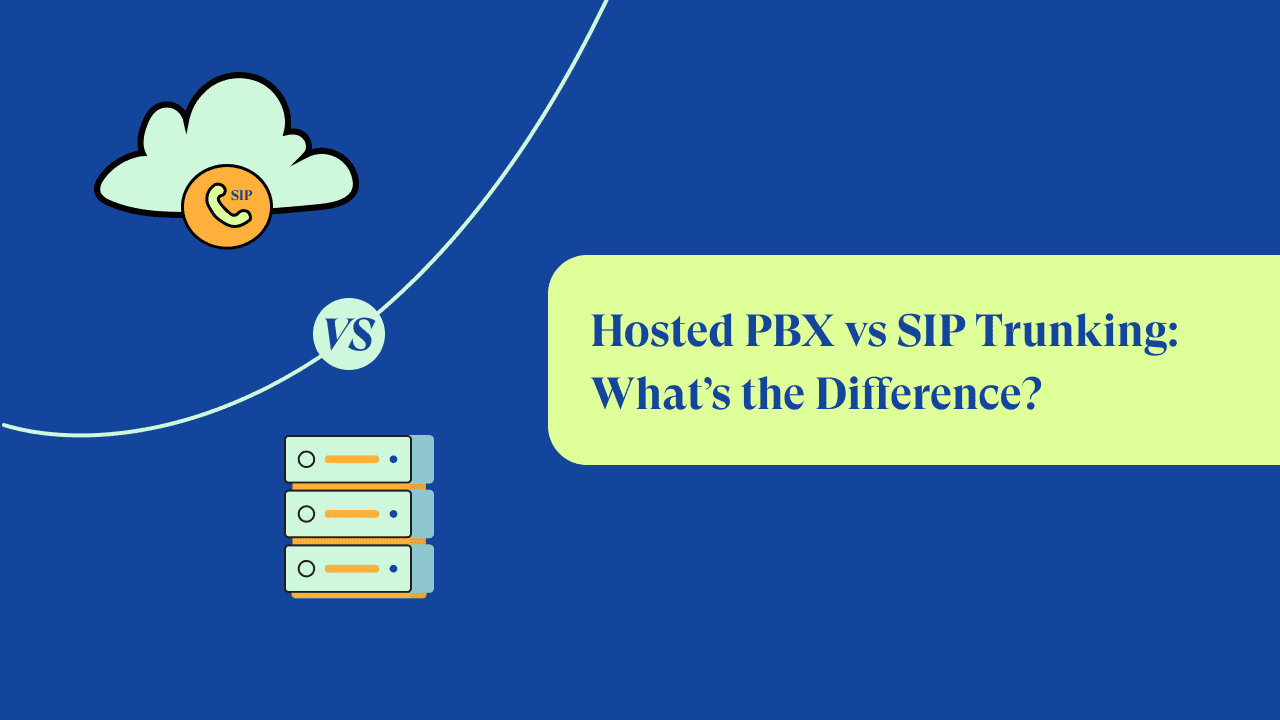As businesses continue to evolve and embrace new technologies, choosing the right solution for their communication needs is becoming increasingly important. Two popular options for companies are Hosted PBX and SIP Trunking.
Hosted PBX refers to a cloud-based voice-over-internet phone system that allows businesses to make and receive calls over the Internet. In contrast, SIP Trunking is a solution that connects a business’s on-premises phone system to the public telephone network via the Internet.
Choosing the right solution can significantly impact a business’s productivity, efficiency, and customer experience. For example, hosted PBX can offer flexibility, scalability, and cost-effectiveness, while SIP Trunking can provide greater control and customization options.
Therefore, it’s essential to understand the differences between these two options and choose the one that best suits a business’s unique communication needs.
Comparison of Hosted PBX and SIP Trunking
The choice between Hosted PBX and SIP Trunking ultimately depends on a business’s requirements. Let us compare the differences between these two digital phone solutions and compare them to determine the best fit for your organization.
Cost comparison
Regarding business communication, Voice-over-Internet Phone systems (VoIP) have become increasingly popular. With the advent of Hosted PBX and SIP Trunking, businesses now have more options. While both offer significant advantages over traditional PBX phone systems, cost differences exist.
The Cost Comparison between Hosted PBX and SIP Trunking can be divided into two main categories: early design expenses and recurring costs.
Early Design Expenses
Hosted PBX is usually the most cost-effective option. Since it’s hosted on the cloud, businesses don’t need to invest much in hardware. All that’s required is routers, phones, and an internet connection.
On the other hand, SIP Trunking requires businesses to have an on-site PBX phone system. This can lead to additional expenses if the current hardware needs to be updated and replaced.
Recurring Costs
Hosted PBX and SIP Trunking charge businesses based on specific plans. Hosted PBX providers typically charge based on the number of subscriptions and services availed. Some network operators may also charge per minute, while others may offer unlimited domestic and international calls.
SIP Trunking providers charge based on the number of telephone lines monthly. Some providers may also charge a fixed monthly cost plus an additional charge based on call minutes.
The verdict: Hosted PBX is typically the most cost-effective option for small businesses that do not have on-site PBX hardware. However, SIP trunking may be better if a company already has on-site PBX hardware and wants greater control and customization options.
Scalability and Customization
While both options offer flexibility and scalability advantages over traditional PBX phone systems, there are differences in how they handle scalability.
Hosted PBX is highly recommended for businesses of all sizes because it is hosted on the cloud. This means companies do not have to invest in hardware on-premises but instead use a third-party provider. This can be more affordable and manageable for small and medium-sized businesses.
In terms of scalability, the growth potential is primarily determined by the vendor’s scalable features and add-ons. This makes Hosted PBX an excellent option for businesses that need to scale quickly without worrying about the infrastructure’s limitations.
On the other hand, SIP Trunking may require more significant investment expenses due to the need to purchase new hardware and retire existing equipment. In addition, as a business grows with this system, it’s essential to increase in-house tech support to manage it effectively. Despite this, SIP Trunking can work well with big companies with the resources to maintain and manage it. In addition, since it is an on-premises system, it can be customized to meet specific business requirements, making it a more flexible option for larger enterprises.
The Verdict: Hosted PBX is the more cost-effective and manageable option for small to medium-sized companies that need to scale quickly. On the other hand, SIP Trunking is a more flexible and customizable option for larger enterprises with the resources to maintain and manage it.
Reliability and uptime
Reliability and uptime are critical factors when selecting a business phone service provider. You want a system that is dependable and available when you need it.
Hosted PBX is typically hosted in data centers designed for redundancy and uptime. This means your phone system is backed up by multiple servers and data centers, ensuring maximum uptime and reliability. The hosted PBX provider is also responsible for maintaining and updating the system, ensuring it’s always up-to-date with the latest technology and security patches.
On the other hand, SIP trunking relies on your infrastructure, like an in-house IT team, for uptime and reliability. Therefore, your PBX must be updated to ensure compatibility with the SIP trunking provider. You must also provide a reliable internet connection and sufficient bandwidth to support your voice traffic.
However, if you have a well-maintained and updated PBX and a reliable internet connection, SIP trunking can be just as reliable as hosted PBX. In addition, you have control over your infrastructure and can tailor it to your specific needs, resulting in better performance and reliability.
The verdict: Hosted PBX is generally the more reliable option due to the redundancy and uptime provided by the data centers. However, if you have a well-maintained and updated PBX and a reliable internet connection, SIP trunking can also be a reliable option.
Flexibility and mobility
When it comes to flexibility and mobility, both hosted PBX and SIP trunking have their advantages.
With a hosted PBX, your employees can make and receive phone calls from any location with an internet connection. This is because your phone system is hosted on the cloud, and your employees can use various technologies like VoIP applications and softphones to make phone calls. This flexibility enables your employees to work from anywhere, increasing productivity and reducing costs associated with office space.
SIP trunking provides even more flexibility and mobility for your workforce. It enables you to connect remote workers to your phone system. Your employees can use their mobile phones or any other device with internet connectivity to access the phone system. A good SIP provider can provide remote workers with a dedicated phone number linked to their workplace number. This way, employees can receive calls to their extension quickly, regardless of location.
In terms of mobility, SIP trunking is the clear winner. It enables you to connect a broader range of devices to your phone system, including mobile phones, tablets, and laptops. Hosted PBX is also suitable for mobility, but it may not provide the same level of flexibility and connectivity that SIP trunking offers.
The verdict: SIP trunking wins for flexibility and mobility, with its ability to connect remote workers to the phone system and support a wide range of devices. However, hosted PBX still offers decent mobility capabilities, making it a suitable choice for businesses that do not require extensive remote working capabilities.
Security and privacy
Hosted PBX is as safe as its third-party provider. On the one hand, providers have more resources to protect their systems and, therefore, strong security measures. Your service provider is responsible for security measures like encrypting calls, maintaining firewalls, and monitoring suspicious activity. As such, your company may benefit from the provider’s advanced security measures without incurring additional costs.
On the other hand, you and your customers are liable for any security issues on the provider’s end. Hosted PBX may also result in added privacy concerns because of the need to expose your company’s internal IP addresses to the public Internet.
SIP Trunking, too can be vulnerable to security breaches since it requires more management and oversight. However, with a dedicated in-house IT staff that prioritizes your security, they can ensure the network is secure and that all equipment is updated to the latest security standards.
The Verdict: While Hosted PBX offers more in-built security, SIP Trunking can be more secure with proper management and oversight. Ultimately, the system choice depends on your company’s security needs and the resources to manage them.
Ease of Use and Management
Both hosted PBX and SIP trunking offer advantages regarding the ease of use and management of voice-over-internet phone systems.
Hosted PBX is easier to set up and manage, as the service provider manages most of the hardware and software components. This means the provider is responsible for maintenance, updates, and troubleshooting, making it easier for businesses to handle their phone systems. Additionally, hosted PBX offers an intuitive user interface, which allows users to easily navigate and access various features, such as call forwarding, voicemail, and call recording.
On the other hand, SIP trunking requires a more involved setup process, as it involves configuring a business’s existing PBX phone system with the SIP trunk provider’s network. However, once set up, SIP trunking provides greater flexibility and control, allowing companies to quickly manage their phone systems and adjust as needed. SIP trunking also offers a broader range of customizable features, such as caller ID, auto attendant, and call routing, which can be easily configured to meet the specific needs of a business.
Regarding ease of use and management, hosted PBX may be the better option for smaller businesses or those with limited IT resources. At the same time, SIP trunking may be more suitable for larger companies that require more flexibility and control over their phone systems.
The verdict: While both hosted PBX and SIP trunking offer unique ease of use and management advantages, the winner ultimately depends on a business’s needs and resources. For smaller firms, hosted PBX may be the more convenient and manageable option, while larger companies may benefit more from the customization and control offered by SIP trunking.
Choosing the Right Phone System for Your Business
Choosing the right phone system for your business is crucial, as it can impact your communication efficiency, productivity, and customer experience. Factors to consider include your business size, budget, required features, and internet connection.
For example, small businesses may benefit from a hosted PBX phone system, which offers scalability and affordability. However, larger companies may require a SIP trunking solution to handle high call volumes. The type of business you run and the nature of your communication needs will also play a role in your decision.
Consider these examples of implementing each system based on the factors mentioned above.
Hosted PBX Implementation: A small law firm with ten employees opted for a hosted PBX system from a business phone service provider. They could use the system to manage calls, voicemails, and forwarding remotely, which was crucial during the COVID-19 pandemic when most employees worked from home. The firm was also able to save costs on hardware and maintenance, and the hosted system allowed them to scale up or down as needed.
SIP Trunking Implementation: A mid-sized marketing agency with 50 employees upgraded their traditional PBX system to a SIP trunking solution from a SIP trunk provider. This allowed them to consolidate voice and data on a single network, simplifying management and reducing costs. The agency also benefited from improved call quality and greater flexibility in adding or removing phone lines, which was useful for accommodating seasonal changes in staffing.
Start your 14 day Free Trial Upgrade Your Business Communications With an AI Cloud Phone System
Conclusion
Effective communication drives growth and ensures success in today’s business world. A hosted PBX solution with advanced VoIP capabilities is ideal for any business. However, depending on the scale of your business, SIP trunking can be a viable and cost-effective alternative that can provide similar benefits.
It’s crucial to have a robust business VoIP phone service in place to enhance your team’s efficiency, productivity, and scalability. Choosing the right business VoIP phone systems, PBX phone systems, or sip trunk providers is essential to meet your communication needs, regardless of the size of your business.












